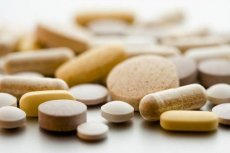Medical expert of the article
New publications
Preparations
L-carnitine
Last reviewed: 23.04.2024

All iLive content is medically reviewed or fact checked to ensure as much factual accuracy as possible.
We have strict sourcing guidelines and only link to reputable media sites, academic research institutions and, whenever possible, medically peer reviewed studies. Note that the numbers in parentheses ([1], [2], etc.) are clickable links to these studies.
If you feel that any of our content is inaccurate, out-of-date, or otherwise questionable, please select it and press Ctrl + Enter.

Theoretical basis
L-carnitine is synthesized in the body from the amino acids lysine and methionine. It is found in animal food (meat, dairy products) and, to a much lesser extent, plant products. This is a short chain carboxylic acid containing nitrogen. About 90% of carnitine entering the body is in muscle tissue. Theoretically, carnitine supplements can increase the oxidation of fatty acids by facilitating the transport of long chain fatty acids in the mitochondria. L-carnitine can also facilitate the oxidation of pyruvate, which increases the utilization of glucose and reduces the formation of lactic acid during exercise.
Research results
The results of studying the additives of L-carnitine do not prove its ergogenic effect. Trappe et al. The effect of L-carnitine supplementation on swimmers was evaluated to determine if L-carnitine would improve the indices, reducing the accumulation of lactic acid. Subjects were 20 male swimmers from the university team who had been training for 16 weeks before the experiment.
Subjects performed 5 repetitions of 100-yard distance with a 2-minute recovery period between the swimmers before and after one week of taking L-carnitine supplements. The group, which used supplements in the morning and evening, received 236 ml of a citrus drink containing 4 g of L-carnitine. The group using the placebo received the same amount of citrus drink, but without L-carnitine. In the final swim, there were no differences between the two groups for lactic acid, blood pH, and swimming speed, indicating that the use of L-carnitine does not improve performance.
Greig et al. Examined the effect of L-carnitine supplements on the maximum and submaximal ability to perform exercises. In two separate tests, two groups of untrained persons received either 2 g of L-carnitine per day or a placebo for two weeks. The ability to perform the exercises was assessed using continuous ergometry. There was a slight improvement in submaximal values at 50% V02max in the L-carnitine test. However, the heart rate was slightly lower for any intensity of exercise during the maximum physical exertion in the L-carnitine group. The researchers concluded that the addition of L-carnitine slightly improves the performance or does not improve at all.
Recommendations
The results of numerous studies of additives of L-carnitine negate its ergogenic benefit, but further study is necessary. While L-carnitine appears to be a harmless additive, there are fears that it can be falsified and contain D-carnitine, which can be toxic, as it depletes L-carnitine and leads to a deficiency of carnitine.
Attention!
To simplify the perception of information, this instruction for use of the drug "L-carnitine" translated and presented in a special form on the basis of the official instructions for medical use of the drug. Before use read the annotation that came directly to medicines.
Description provided for informational purposes and is not a guide to self-healing. The need for this drug, the purpose of the treatment regimen, methods and dose of the drug is determined solely by the attending physician. Self-medication is dangerous for your health.


 [
[